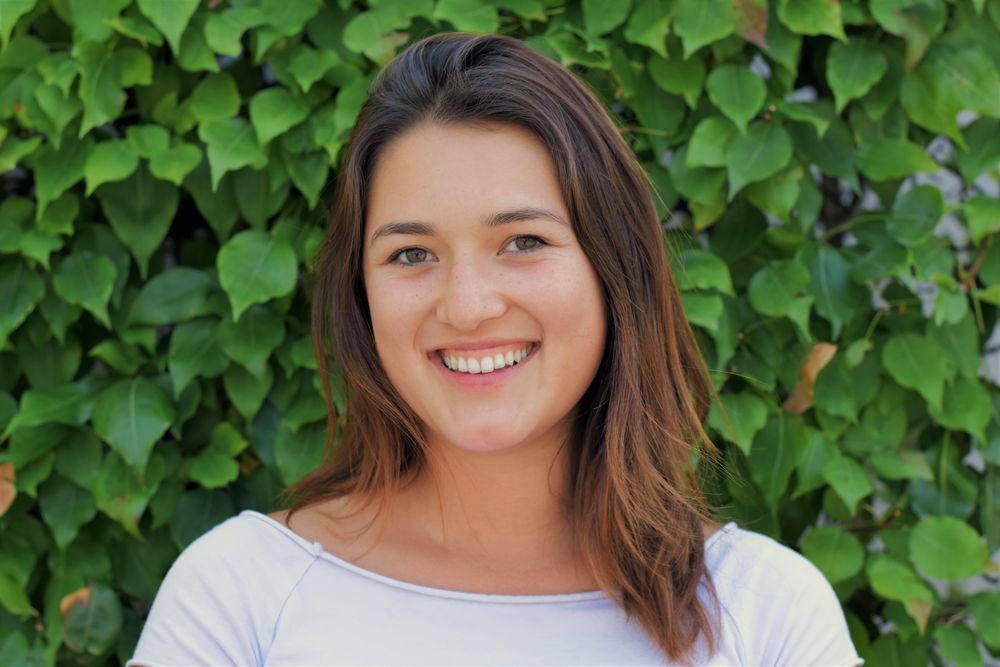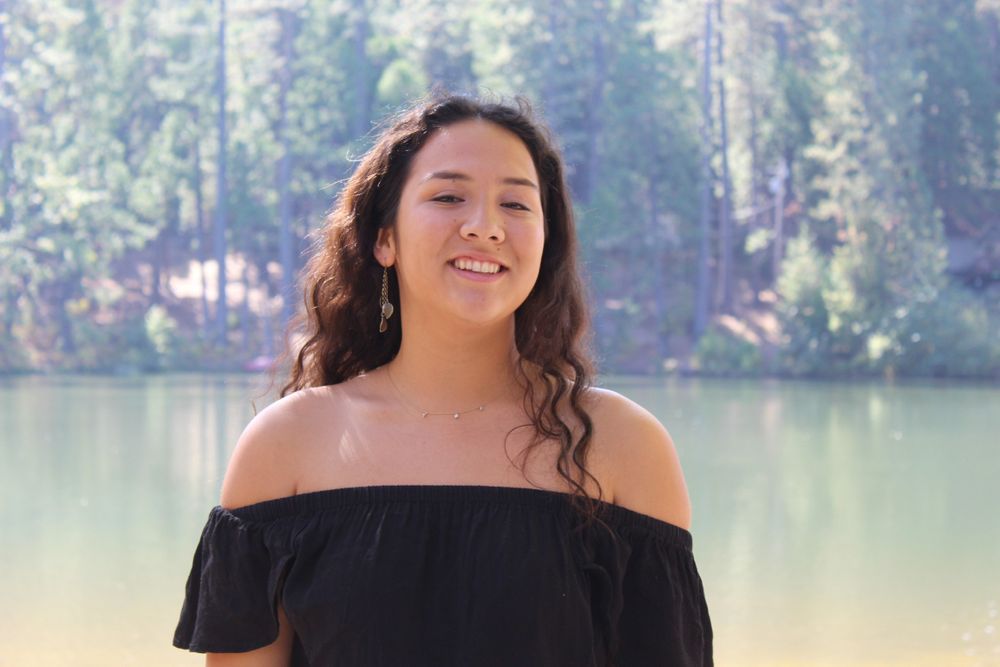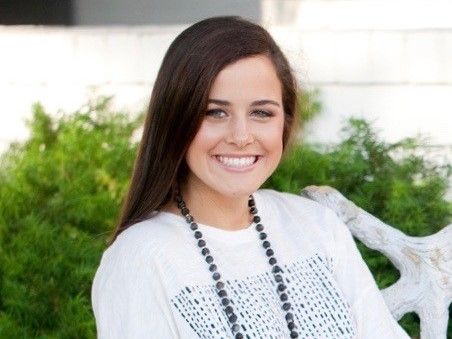/f/78141/6000x4000/b0085c4375/tom-hermans-9boqxzeeqqm-unsplash.jpg)
Stanford students showcase their creativity and compassion during COVID-19
These students are paying it forward. Drawing on inspiration from their peers and lessons learned from their Stanford experiences, members of the Class of 2020 are finding creative ways to make a positive impact during unprecedented times.
Engaging kids stuck at home with an online book club

Kiki Couchman, ’20
Each week, Kiki Couchman, ’20, leads her virtual book club one chapter at a time. Club members take turns reading aloud, pausing if needed to define a new vocabulary word. At the end of each meeting, they laugh over MadLibs and play a few rounds of charades.
This isn’t your typical book club.
Kiki started this group, Becoming Bookworms, in March 2020 after recognizing that many families were facing new struggles with school closures, remote learning, and lack of childcare.
“My aim was to alleviate stress on parents and to provide an engaging, fun way for children to learn,” Kiki says. “Many parents are now working from home while also entertaining and helping their children navigate a new online education system.”
The group of kids, led by Kiki, range in age from 4 to 10 years old. They meet over Zoom for an hour each day and read from a book chosen with care.
“I try to expand their horizons by adding new books with different themes while still maintaining the general attributes that I know will keep them engaged.”
Working with youth is nothing new for Kiki. In high school, she tutored young students in under-served communities. At Stanford, she joined a service group, Women and Youth Supporting Each Other (WYSE), and mentored middle school girls in East Palo Alto. When Kiki first started Becoming Bookworms, she advertised her project by any means possible—Facebook, the local newspaper, and the local school district newsletter. These days, kids are joining through word of mouth, and their parents approve.
“Parents are enthusiastic and greatly appreciative. They have expressed how difficult this time is for them—working at home while also taking care of their kids and acting as a supplemental teacher,” she says.
Kiki has been running Becoming Bookworms for three months now, and she plans to continue it into the summer.
“Seeing the children so excited to read and to engage with me and each other—that’s what keeps me motivated.”
Hometown help for local restaurants and health care workers

Emma Hard, ’20
After leaving campus in March, Emma Hard, ’20, was distressed to see the impact of the pandemic in her hometown of New York City.
It wasn’t long before she threw herself behind a relief effort that addressed two major problems—getting food industry staff back to work and caring for overextended health care workers.
A family friend and local restaurant owner had started the program Feed the Frontlines NYC as a way to bring employees back to work while also serving the community. Emma immediately joined in.
“Seeing my friend and her family put their lives on the line by delivering meals every day, and just being in this city and knowing how many people are at risk, made me want to help in any way possible.”
So far, the organization has delivered more than 130,000 meals to health care workers at 100 facilities.
Emma spread the word to her Stanford network and encouraged them to find a way to serve their own communities.
“Seeing my friend and her family put their lives on the line by delivering meals every day, and just being in this city and knowing how many people are at risk, made me want to help in any way possible.”
Emma Hard, ’20

Margaret Murray, ’20
Miles away in Texas, Margaret Murray, ’20, was quick to respond.
Margaret had already been thinking about the workers hardest hit by the COVID-19 crisis. After hearing about Emma’s volunteerism, she began reaching out to local restaurants—and eventually found a separate but closely named program in her community, Feed the Front Line Texas, that follows a similar model.
“Throughout my time at Stanford, I have seen my friends initiate projects and programs in reaction to crises. This has encouraged me to do the same.”
Margaret is helping to fundraise and facilitate partnerships with local restaurants and hospitals for the program. As part of their outreach strategy, she also has started a letter writing campaign, which is enabling hundreds of high school students around Texas to write letters of appreciation to health care workers.

Maggie McGraw, ’20
Meanwhile in Nashville, another friend stepped forward. Maggie McGraw, ’20, reached out to the organization Feed the Front Line Nashville, and she is now helping them by managing corporate sports and entertainment sponsorships.
“I have always had a soft spot for Nashville. Seeing the closures of several local restaurants, especially the mom and pop restaurants, broke my heart. These small businesses help make up Nashville’s charm.”
In May, she helped organize a multi-hour, star-studded virtual benefit concert in support of Feed the Front Line’s mission. The live event featured some of the largest acts in country music and stories directly from frontline workers and restaurant owners who have been sustained by Feed the Front Line donations.
Emma, Margaret, and Maggie have all stepped up to help their hometowns in a big way, and they drew on one another for inspiration. For this, Maggie is grateful.
"Everyone at Stanford is so passionate, motivated, and inspirational. I feel really grateful that I have been able to attend a university that attracts people who want to make change," she says.
Connecting volunteers with those in need
Back home in the Los Angeles area, Priya Chatwani, ’20, and her younger sister, a freshman in college, suddenly found themselves with a lot more time on their hands. As the two brainstormed ways to help with the COVID-19 crisis, a simple thought occurred to them.
“I realized there are probably a lot of other young people out there, also suddenly with more time on their hands, trying to figure out how they can help,” Priya says.
Within a week, Priya, her sister, and Stanford alumnus J.J. Ram, ’19, created a website called LA Helping Hands, with the goal of matching low-risk volunteers with high-risk or immunocompromised individuals in need of virtual companionship, grocery delivery, and other essential services.
The trio used social media to get the word out but ended up with more volunteers than requests for assistance. So they started calling senior living apartments, community centers, and religious organizations to promote their free resource. They also added a phone line to field requests and questions from those unable to access the service online.
Their big break came when the Los Angeles Mayor’s Office started directing local citizens to LA Helping Hands. Ever since, they have been fielding more than 30 calls per day. They recently merged with AllTogether LA, which was previously operating in West LA, to jointly fundraise for groceries for low-income seniors and expand their collective reach county-wide.
Priya says her experience working with Stanford’s Haas Center for Public Service and the student-led CS+Social Good program motivated her in this new endeavor. “I began to see that there are things young people can do to have larger institutional effects,” she says.
Helping consumers make informed decisions and promoting companies that do good
As everyday life started to shift dramatically, Mitzi Harris, ’20, noticed that several companies were finding creative ways to respond to the COVID-19 crisis.
She felt inspired by these organizations stepping up to provide aid to communities in need, but she also found the windfall of information difficult to actually keep track of.
She spoke with her classmate Nicolai Garcia, ’20, and together, the two came up with the idea of creating a database of corporate aid programs. Nicolai started building the website while Mitzi researched and interviewed companies, all while getting up to speed on things like user interface design and data organization.
A few weeks later, Companies for COVID was born.
Mitzi says the goal of Companies for COVID is to provide a comprehensive list of brands that are “doing everything from repurposing factories, to allocating funds for relief programs, to producing and donating supplies.”
The website highlights the types of aid provided and how a purchase amplifies the impact of that aid. Ultimately, both Mitzi and Nicolai hope that it helps consumers understand the impact of their patronage and be more intentional in choosing which companies to support. One additional unique aspect of this project is the inclusion of COVID-inspired works of art in a virtual gallery.
“Art-making is an incredibly therapeutic practice,” Nicolai says. “We asked members of our community to make their own artistic interpretations of the COVID particle and aspects of life that have become a reality in the era of quarantine. In showcasing these artworks, we hope to generate a sense of positivity in a time of great uncertainty.”
While Mitzi is now focused on a new project—a fundraising group she started and now manages, Farmlink—she’s grateful for all that she learned through Companies for COVID.
“Working on this project has shown me how much I care about being at a company that’s driven by making an impact,” she says. “That has guided my job search.”
And, she’s grateful for her time at Stanford, which she credits with bolstering her entrepreneurial spirit.